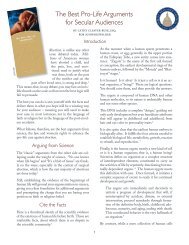The Effects of Divorce on Children - Family Research Council
The Effects of Divorce on Children - Family Research Council
The Effects of Divorce on Children - Family Research Council
Create successful ePaper yourself
Turn your PDF publications into a flip-book with our unique Google optimized e-Paper software.
following a divorce. 224 Parents’ accumulated wealth differs widely across family<br />
structures and affects the amount <str<strong>on</strong>g>of</str<strong>on</strong>g> financial support available for their<br />
children’s college educati<strong>on</strong>. Compared with married parents (59 percent),<br />
divorced parents (36 percent) are less likely to pay for all or most <str<strong>on</strong>g>of</str<strong>on</strong>g> their<br />
children’s college expenses. <str<strong>on</strong>g>Divorce</str<strong>on</strong>g>d parents (29 percent) are actually more likely<br />
than married parents (17 percent) to provide no assistance at all. 225<br />
B. Financial Weakness am<strong>on</strong>g <str<strong>on</strong>g>Divorce</str<strong>on</strong>g>d Women<br />
Decreased Income. Many women experience a substantial decline in their<br />
financial circumstances after divorce, which in turn affects their children.<br />
Analysis <str<strong>on</strong>g>of</str<strong>on</strong>g> the 1987-1988 and 1992-1994 waves <str<strong>on</strong>g>of</str<strong>on</strong>g> the Nati<strong>on</strong>al Survey <str<strong>on</strong>g>of</str<strong>on</strong>g><br />
Families and Households found that household income for a mother and children<br />
fell by $13,000 after divorce. Additi<strong>on</strong>ally, their standard <str<strong>on</strong>g>of</str<strong>on</strong>g> living was 20 percent<br />
lower and their odds <str<strong>on</strong>g>of</str<strong>on</strong>g> owning a home were 12 percentage points lower. 226<br />
<str<strong>on</strong>g>The</str<strong>on</strong>g> detrimental effects <str<strong>on</strong>g>of</str<strong>on</strong>g> divorce <strong>on</strong> women’s income vary based <strong>on</strong> the relative<br />
earnings capacity <str<strong>on</strong>g>of</str<strong>on</strong>g> the husband and wife. Women who experience the largest<br />
income losses (38.5 percent for a mother with <strong>on</strong>e child) are “the ‘low educati<strong>on</strong>’<br />
mother[s] who [were] married to a ‘high educati<strong>on</strong>’ man.” 227 C<strong>on</strong>versely, highly<br />
educated mothers who were married to a less educated man experience the<br />
smallest effect <str<strong>on</strong>g>of</str<strong>on</strong>g> divorce <strong>on</strong> their equivalent household income (11.2 percent). 228<br />
Poverty. High divorce rates mean that the children <str<strong>on</strong>g>of</str<strong>on</strong>g> poor families have fewer<br />
adults to support them. Nearly 56 percent <str<strong>on</strong>g>of</str<strong>on</strong>g> poor families with children had <strong>on</strong>ly<br />
<strong>on</strong>e adult, but less than 14 percent <str<strong>on</strong>g>of</str<strong>on</strong>g> n<strong>on</strong>-poor families with children have <strong>on</strong>ly<br />
<strong>on</strong>e adult. 229 One study goes so far as to assert that “[c]hanges <str<strong>on</strong>g>of</str<strong>on</strong>g> family structure<br />
[i.e., divorce] are by far the major cause <str<strong>on</strong>g>of</str<strong>on</strong>g> initial spells <str<strong>on</strong>g>of</str<strong>on</strong>g> poverty am<strong>on</strong>g femaleheaded<br />
households.” 230<br />
224<br />
Peggy O. Corcoran (Ann Arbor, MI: Survey <strong>Research</strong> Center, University <str<strong>on</strong>g>of</str<strong>on</strong>g> Michigan, 1994,<br />
unpublished paper).<br />
225<br />
Paul R. Amato, Sandra J. Rezac, and Alan Booth, “Helping Between Parents and Young<br />
Adult Offspring: <str<strong>on</strong>g>The</str<strong>on</strong>g> Role <str<strong>on</strong>g>of</str<strong>on</strong>g> Parental Marital Quality, <str<strong>on</strong>g>Divorce</str<strong>on</strong>g>, and Remarriage,” Journal <str<strong>on</strong>g>of</str<strong>on</strong>g><br />
Marriage and <strong>Family</strong> 57 (1995): 373.<br />
226<br />
Thomas L. Hans<strong>on</strong>, Sara S. McLanahan, and Elizabeth Thoms<strong>on</strong>, “Windows <strong>on</strong> <str<strong>on</strong>g>Divorce</str<strong>on</strong>g>:<br />
Before and After,” Social Science <strong>Research</strong> 27 (1998): 337.<br />
227<br />
Matthew Gray and Bruce Chapman, “Relati<strong>on</strong>ship breakdown and the ec<strong>on</strong>omic welfare <str<strong>on</strong>g>of</str<strong>on</strong>g><br />
Australian Mothers and their children” (Crawford School <str<strong>on</strong>g>of</str<strong>on</strong>g> Ec<strong>on</strong>omics and Government, <str<strong>on</strong>g>The</str<strong>on</strong>g><br />
Australian Nati<strong>on</strong>al University, 2007, 2008), 28.<br />
228<br />
Matthew Gray and Bruce Chapman, “Relati<strong>on</strong>ship breakdown and the ec<strong>on</strong>omic welfare <str<strong>on</strong>g>of</str<strong>on</strong>g><br />
Australian Mothers and their children” (Crawford School <str<strong>on</strong>g>of</str<strong>on</strong>g> Ec<strong>on</strong>omics and Government, <str<strong>on</strong>g>The</str<strong>on</strong>g><br />
Australian Nati<strong>on</strong>al University, 2007, 2008), 28.<br />
229<br />
David M. Bets<strong>on</strong> and Robert T. Michael, “Why So Many <strong>Children</strong> Are Poor,” <str<strong>on</strong>g>The</str<strong>on</strong>g> Future <str<strong>on</strong>g>of</str<strong>on</strong>g><br />
<strong>Children</strong> 7 (1997): 31.<br />
230<br />
Julia A. Heath, “Determinants <str<strong>on</strong>g>of</str<strong>on</strong>g> Spells <str<strong>on</strong>g>of</str<strong>on</strong>g> Poverty Following <str<strong>on</strong>g>Divorce</str<strong>on</strong>g>,” Review <str<strong>on</strong>g>of</str<strong>on</strong>g> Social<br />
Ec<strong>on</strong>omy 50 (1992): 305-315.<br />
33




